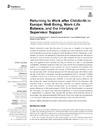Please use this identifier to cite or link to this item:
http://hdl.handle.net/10553/41823
| Title: | Returning to work after childbirth in Europe: well-being, work-life balance, and the interplay of supervisor support | Authors: | Lucia-Casademunt, Ana M. García-Cabrera, Antonia M. Padilla-Angulo, Laura Cuéllar-Molina, Deybbi |
UNESCO Clasification: | 6306 Sociología del trabajo | Keywords: | Human-Resource Management Family Conflict Job-Satisfaction Health Performance, et al |
Issue Date: | 2018 | Project: | El Cambio Regulativo, Normativo y Cognitivo-Cultural Como Promotor Del Emprendimiento Internacional de la Empresa Española. Propuestas de Adaptación E Innovación Institucional | Journal: | Frontiers in Psychology | Abstract: | Parents returning to work after the arrival of a new son or daughter is an important question for understanding the trajectory of people's lives and professional careers amid current debates about gender equality and work-life balance (WLB). Interestingly, current research concludes that general WLB practices at the workplace may be necessary in the specific case of women returning to work after childbirth because of the particular maternal and infant factors involved. However, WLB practices as a flexible arrangement may work against women because they may be viewed as a lack of organizational commitment. Therefore, research on this topic could benefit from considering supervisor support as a complement of such practices, but previous research has analyzed WLB and supervisor support separately and scarcely. To fill this gap in the literature, we use two sub-samples of 664 female employees and 749 male employees with children under the age of one from 27 European countries participating in the 6th European Working Conditions Survey (EWCS-2015) to study the impact of perceived WLB on European women's perceived well-being after childbirth, in contrast with previous literature. We also analyze the impact of perceived supervisor support (SS) and its interaction with perceived WLB on women's well-being after childbirth, and explore differences with men after childbirth, a collective underexplored by the literature. We find significant gender differences on the relative impact of WLB, SS, and their interaction on perceived job well-being. Our results have important implications for human resource practices in organizations. In particular, they suggest that gendered WLB practices should be encouraged, and stress the relevance of the human factor over human resource practices in addressing the difficulties that women returning to work face after childbirth. | URI: | http://hdl.handle.net/10553/41823 | ISSN: | 1664-1078 | DOI: | 10.3389/fpsyg.2018.00068 | Source: | Frontiers in Psychology [ISSN 1664-1078], v. 9(68) |
| Appears in Collections: | Artículos |
SCOPUSTM
Citations
20
checked on Apr 21, 2024
WEB OF SCIENCETM
Citations
24
checked on Feb 25, 2024
Page view(s)
94
checked on Oct 28, 2023
Download(s)
108
checked on Oct 28, 2023
Google ScholarTM
Check
Altmetric
Share
Export metadata
Items in accedaCRIS are protected by copyright, with all rights reserved, unless otherwise indicated.
